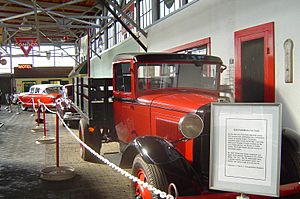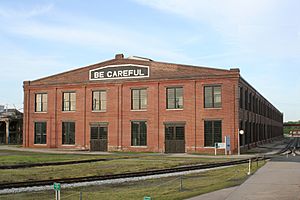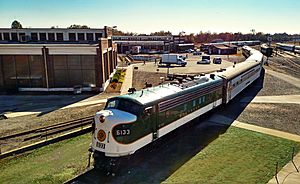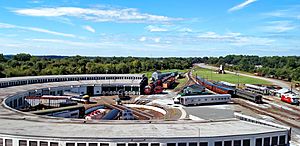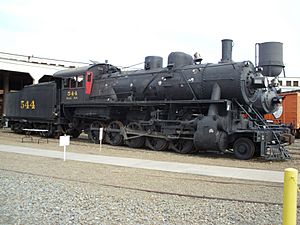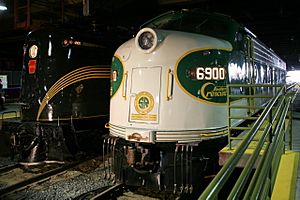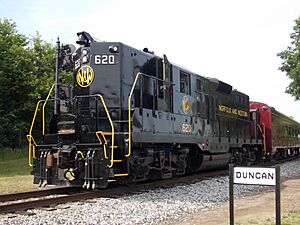North Carolina Transportation Museum facts for kids
The North Carolina Transportation Museum is an exciting place in Spencer, North Carolina. It's a museum filled with cool automobiles, amazing aircraft, and historic trains. The museum is built on the site of the old Southern Railway's Spencer Shops, which opened way back in 1896. A big part of the museum shows off North Carolina's rich railroad history. It has the biggest collection of old train items in North and South Carolina. One of its most impressive buildings, the Back Shop, is super tall (almost three stories high) and as long as two football fields!
Contents
History of the Museum
The museum started in 1977. That's when the Southern Railway gave 4 acres of land to North Carolina to create a transportation museum. Two years later, in 1979, they added another 53 acres. This included all of the railway's biggest old repair shops for steam locomotives.
The museum's first exhibit, called "People, Places and Time," opened in 1983. The museum kept growing over the years. A big step happened in 1996 with two important additions:
- Barber Junction: This was an old train station that was moved about 30 miles to the museum. It now serves as the museum's Visitor Center. It's also where you start your on-site train ride!
- Bob Julian Roundhouse: This building was renovated and became a main spot for many of the museum's train exhibits. It also has airplane displays and tells the story of the site itself.
Inside the Roundhouse
The roundhouse was built in 1924. Several sections of it are now used to show off locomotives and train cars. Volunteers work hard to restore these old pieces. From 1924 to 1953, this was where steam locomotives were repaired.
- In the first 16 stalls, you can walk among huge locomotives and rail cars. They are displayed in an open area.
- Stalls 17 through 20 are inside the Elmer Lam gallery. Here, you'll find aviation exhibits. These include a full-size replica of the Wright Flyer and displays about Piedmont Airlines.
- Stalls 21 through 32 are the restoration shop. You might see volunteers working on different train parts here. They even make new parts!
- The last five stalls have more indoor exhibits.
The museum is the largest place for train history in North and South Carolina. About 80,000 people visit it every year. In the early 1900s, about three thousand people worked at the Spencer Shops to repair trains.
The Flue Shop, where parts for steam engines were made, is now the "Bumper To Bumper" exhibit. This area features cool vintage and antique cars. You can see several Model Ts, a Model A, and even a Ford Model R (which came before the Model T in 1907). Other vehicles include a 1935 Highway Patrol car, a Divco Milk Truck, and a Lincoln Continental.
Back Shop Renovation
In 2005, the museum's Back Shop building got a huge makeover. This included fixing the roof, repairing the bricks, and making the floor stronger. This building is where steam locomotives used to get completely rebuilt. It's famous for its size: it's as long as two football fields and nearly three stories tall! You can also see the words "Be Careful" painted on the wall, standing about three feet tall. You can spot them from almost anywhere on the north side of the museum.
In 2009, the museum opened the Back Shop to the public for the first time, with a ramp on the south end. By 2017, the Back Shop was fully open, allowing even more exhibits to be displayed.
Heritage Railroad Rides
The museum has its own heritage railroad. This means it runs passenger excursion trains on certain days throughout the year. These trains are usually pulled by either the Norfolk and Western GP9 No. 620 or the Southern GP30 No. 2601 diesel locomotives. Sometimes, other cool diesel locomotives are used, like the Southern FP7 No. 6133, Southern E8A No. 6900, and Atlantic Coast Line E3 No. 501.
The museum doesn't have its own steam locomotives that run. However, it sometimes has visiting steam locomotives. These have included Lehigh Valley Coal 0-6-0T No. 126, Flag Coal Company 0-4-0T No. 75, and Jeddo Coal Company 0-4-0T No. 85. All of these are owned by the Gramling Locomotive Works.
Special Train Visitors
- In 2012 and 2013, the Tennessee Valley Railroad Museum's Southern 2-8-0 No. 630 steam locomotive visited. It offered rides to Barber Junction and Winston-Salem, North Carolina.
- From 2014 to 2015, the famous Norfolk and Western 611 steam locomotive was restored at the museum. This locomotive is owned by the nearby Virginia Museum of Transportation. After its restoration, it ran public trips from Spencer to places like Lynchburg, Virginia; Asheville, Charlotte, and Greensboro, North Carolina in 2016 and 2017. The No. 611 has also been used at the museum for special "At The Throttle" and "Be The Fireman" experiences, where people could ride in the cab or caboose, or take passenger train rides around the museum grounds.
- In 2015, the American 4-4-0 "Leviathan" locomotive visited for the Lincoln Funeral Train event. This event remembered 150 years since that historic train journey.
You can also buy tickets to ride the roundhouse turntable, which is a unique experience!
Museum Events
The museum hosts many annual events and special train events. These bring train fans from all over the country!
Past Special Events
- In 2012, the Bob Julian Roundhouse was the setting for all 20 of Norfolk Southern's Heritage locomotives. This was a two-day photo event.
- In 2014, the museum hosted "Streamliners at Spencer." This event brought together famous 1930s-1950s era locomotives around the Bob Julian Roundhouse turntable for four days. The No. 611 steam locomotive, visiting from the Virginia Museum of Transportation, was part of this event. This special locomotive stayed in Spencer for repair and restoration work so it could once again pull passenger trips across the Southeast.
Annual Events
The museum has many fun events every year, including:
- Day Out With Thomas (featuring Thomas the Tank Engine!)
- The Polar Express (a popular holiday train ride)
- Fire Truck Show
- Automobile shows
- A Tractor Show
- The Harvest Festival
- The Easter Bunny Express
- Valentine Wine and Dine trains
- The new Brew and Choo Beer Train
The NCTM also hosts the Boy Scout Rail Camp. This event allows Boy Scouts and their leaders to camp at the historic facility and earn the railroading merit badge. It's the biggest railroad-related scouting event in the nation!
Museum Collection
The museum has a large collection of both steam and diesel locomotives.
Steam Locomotives
- Graham County Railroad Company Class C Shay #1925
- Atlantic Coast Line Railroad 4-6-0 #1031
- Southern 2-8-0 #542
- Seaboard Air Line Railroad 2-10-0 #544
- Carolina Power & Light Company 0-4-0F #3
- Duke Power Company 0-4-0ST #111
- W.R. Bonsal Company 0-6-0T #7
Diesel Locomotives
- Southern E8A-Unit #6900
- Norfolk & Western GP9 #620
- Atlantic Coast Line E3A-Unit #501
- Southern GP30 #2601
- Southern FP7-Unit #6133
- US Navy 44 ton switcher # 65-00556
- Buck Steam Station GE 25 Ton switcher #5159
- USA/Beaufort & Morehead H12-44 #1860
- Norfolk Southern Railway (former) Baldwin AS 416 #1616
- Amtrak F40PHR #307
- NC Port Authority GE 45 ton switcher #L3
- Southern FTB #960604
Electric Locomotives
- Piedmont & Northern GE 63 ton Boxcab-#5103
Notable Exhibits
- "The Doris": This is a private rail car that belonged to James B. Duke. He was famous for the American Tobacco Company and Southern Power Company. He named the car after his daughter, Doris.
- "The Loretto": This private rail car was first built in 1902 for Charles Schwab, a steel businessman. It later belonged to Spring Mills in Fort Mill, South Carolina. It has beautiful stained glass windows and fancy carvings decorated with gold leaf.
- "Southern Railway Car No. 1211": This car was built in 1917 for the Southern Railway. It was originally divided to follow "Jim Crow laws" of the time. The car was rebuilt in 1939 and again in 1953. It was added to the NRHP in April 2022. It is being restored to look like it did in the 1940s and 1950s.
Former Exhibits
- Buffalo Creek and Gauley 2-8-0 #4
See also
- List of heritage railroads in the United States
 | Shirley Ann Jackson |
 | Garett Morgan |
 | J. Ernest Wilkins Jr. |
 | Elijah McCoy |


